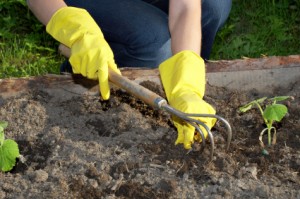There are many reasons for killing weeds organically besides just environmental concerns—asthma, allergies, children, and pets. Whatever your reason, chemical-free weed control is possible. We can provide you with several options for combating the weeds in your yard and garden.
 Manually
Manually
Your first line of defense against the weeds in your garden is to pull them out with your hands. There are a wide variety of tools on the market, both long-handled and hand-held, so you will want to find a tool that works well for you and is easy to use. It is all a matter of choice. Last summer I found a gardening stool that has a curved “foot” as its base. Sitting on the stool, I can use a hand-held claw with much greater ease. The rocking motions of the stool helps keep me from much of the back pain I have had in years past when weeding. Additionally, chickens or ducks can do your weeding for you, if allowed to roam in the garden plot.
Weed Killers
This type of weed control is about the easiest to use and possibly the least expensive. Their one draw back is that they are not designed to protect your other plants, so care is needed when applying them in your garden.
Vinegar – the acid in vinegar changes the pH of the plants and dries them out. This method may take multiple applications. It works the best in the hot sun, so check the forecast before going out to spray the weeds. The residue left from the vinegar dissipates quickly, as it oxidizes after coming in contact with plants and soil.
Vinegar Weed Spray:
- ½ cups lemon juice
- 4 cups white or cider vinegar
Mix together in spray bottle. Spray directly on the weeds, being careful not to hit any desirable plants. Best when used in the heat of the day.
Corn gluten meal – prevents seed germination of weeds. However, it stops germination of ALL seeds, so following application instructions is essential. Corn gluten meal (CGM) must be applied to the soil before weeds germinate in order to be effective. It has no effect upon weeds that have already sprouted and formed a root system. The best time to apply is in the early spring, about 4 to 6 weeks before the weeds sprout and before you’ll be planting your garden. CGM will also attract worms, which are very beneficial in the garden for aeration of the soil. (Corn gluten meal is very different from corn meal. The two are not the same.) Early research from Iowa State University indicates that CGM has no discernible effect on deep-seeded species like beans and peas, but that shallow-seeded species like carrots and lettuce seem to incur damage. It is best to apply this product only in the early spring and fall, again, about 6 weeks before you intend to plant your garden. Read the label instructions carefully and follow them so that you don’t harm your garden seeds.
Boiling Water – pouring boiling water on your weeds is the least expensive and may be the easiest way to control your pesky weeds. Be very careful not to pour it on your garden plants. Also wear gloves or use holders of some kind to protect yourself from burns.
Rock Salt – if you are looking to keep absolutely anything from growing, this may be the way for you to go, naturally. Using salt will kill the weeds – roots and all – but it may also poison the ground. Rock salt is great for gravel drives and parking areas or the weeds growing in cracks of the sidewalk and other concrete areas. Salt used in very small quantities can inhibit plant growth.
This type of weed control is a bit more involved, but the effects can last a lot longer. Barriers keep light out and must be thick enough to keep the weeds from growing through.
Newspaper – wet newsprint forms a natural barrier around your plants to prevent weeds from growing up. Take out any pages with colored ink, as the chemicals from the ink will leach into the soil.
Mulch – spreading a thick layer of mulch on top of a weed control fabric has a similar effect to the wet newspaper. It will not prevent the weeds from growing, but may stop their seeds from germinating.
Commercially Available Weed-Blocking Products
This is an environmentally friendly way to prevent weeds if your home remedies aren’t having much success. There are a variety of products available to target the most stubborn of weeds.
Burnout– an organic vinegar that is 20% vinegar instead of the 5% found in household varieties. It is used as an alternative to toxic chemicals to control pesky weeds.
Weed-Aside Herbicidal Soap – a fatty-acid weed killer that dehydrates the plant’s tissues. It has been used successfully on weeds, unwanted grass, algae, and moss that have already sprouted.
From the natural methods listed here I hope you find something that works well for you. Happy gardening!
———————————————————————————————————
Natural Fertilizer Doubles Garden Production!
Miracle “Sea Nutrients” For Award Winning Size And Flavor!
———————————————————————————————————
 Off The Grid News Better Ideas For Off The Grid Living
Off The Grid News Better Ideas For Off The Grid Living




